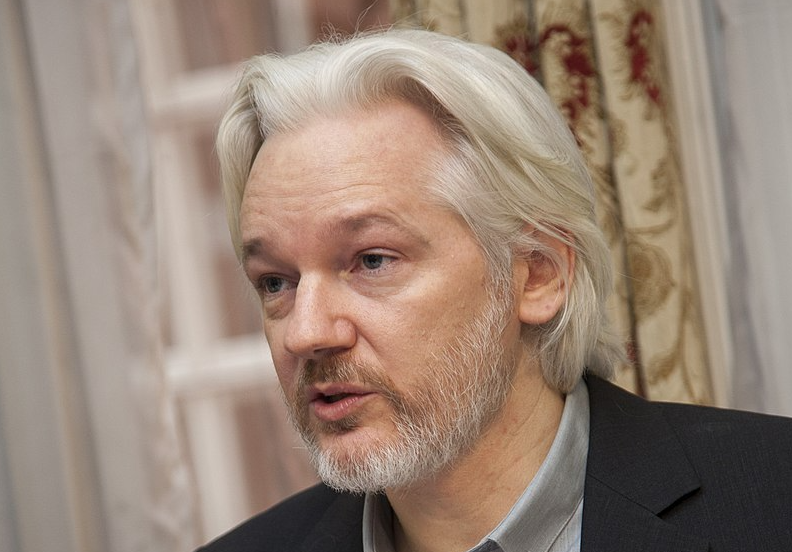Dear Friend of Press Freedom,
Here are some of the most important stories we’re following from the U.S. and around the world. If you enjoy reading this newsletter, please forward it to friends and family. If someone has forwarded you this newsletter, please subscribe here.

Julian Assange speaks at a press conference in London on Aug. 18, 2014. (David G Silvers/Foreign Ministry of Ecuador/licensed under CC BY-SA 2.0)
On Tuesday, the High Court in London granted WikiLeaks founder Julian Assange another hearing on his extradition to the United States, averting — at least temporarily — a press freedom catastrophe.
While we’re glad that Assange isn’t being immediately extradited, the threat to journalists from the Espionage Act charges against him remains.
In response to the court’s ruling, Freedom of the Press Foundation (FPF) Executive Director Trevor Timm called on the Biden administration to drop the case against Assange, explaining that his conviction “would create a dangerous precedent that the U.S. government can and will use against reporters of all stripes who expose its wrongdoing or embarrass it.” Read our full statement here.
Other press freedom and human rights organizations also responded by emphasizing the threat the case poses to press freedom, including the Committee to Protect Journalists, Reporters Without Borders, the Knight Institute at Columbia, PEN International, Amnesty International, and Defending Rights & Dissent.
For more resources on the Assange case and what you can do, visit https://freedom.press/assange/
Tim Burke is a journalist — period
Florida-based independent journalist Tim Burke will be arraigned soon in federal court on troubling charges based on his online newsgathering. Burke’s reporting made national news by revealing unaired footage of an antisemitic rant by Ye, formerly known as Kanye West, on Tucker Carlson’s TV show.
Breaking major news sure sounds a whole lot like journalism. But not everyone agrees. In two new columns, FPF Advocacy Director Seth Stern explains why Burke is indeed a journalist and why his prosecution should concern anyone who cares about press freedom.
Writing in Slate, Stern raises concerns that Department of Justice prosecutors may have labeled Burke as a “former” journalist in court filings to avoid judicial scrutiny of their investigation under the First Amendment, federal law, and even the DOJ’s own policies.
And in the Tampa Bay Times, Stern and Florida First Amendment Foundation Executive Director Bobby Block respond to a column that attempts to explain why the Times refers to Burke as a “former journalist.” Stern and Block write that Burke easily satisfies a “functional definition of who is a journalist” — based on whether the person was performing an act of journalism — when he broke the story of Ye’s edited interview.
Read the full columns in Slate and the Tampa Bay Times for more.
Appeal by NC journalists could impact press freedom statewide
A new appeal in North Carolina by Asheville Blade journalists Veronica Coit and Matilda Bliss could break important legal ground for reporters in the state.
Police arrested Coit and Bliss while they were reporting on and recording a protest and police sweep at a homeless encampment in a public park in Asheville on Christmas Eve of 2021. They’re appealing their convictions on First Amendment grounds.
Press freedom groups have condemned the journalists’ arrests and convictions as contrary to the First Amendment. Now the North Carolina Court of Appeals will weigh in.
Read more on our website about the appeal and its potential impact on all North Carolina journalists who cover protests or police activity in public places.
Congress can’t ban TikTok ‘just in case’
Like a bad penny, bills to ban TikTok keep turning up in Congress. We’ve written before about how such proposals are unconstitutional and would enable mass censorship. The newest legislation that would effectively ban the platform is no exception.
Writing in the Columbia Journalism Review, FPF’s Stern warns that banning TikTok would impose a prior restraint on journalism and set a precedent for future censorship, including bans on foreign news sites.
What we’re reading
Russian court extends WSJ reporter Evan Gershkovich’s detention. This week marks one year since Wall Street Journal reporter Evan Gershkovich was imprisoned on sham “espionage” charges in Russia. It’s outrageous that Gershkovich’s detention continues to be extended when he did nothing wrong. Russia should release him immediately.
Scene reporter arrested at Vanderbilt University. After arresting Nashville Scene reporter Eli Motycka for covering a protest at Vanderbilt University, authorities released him without charges. That’s good. But Motycka never should have been arrested in the first place. Even when journalists are quickly released, arresting them still violates their First Amendment rights and prevents them from reporting.
Sacramento police put me in handcuffs inside City Hall — but I was there as a journalist. Sacramento Bee reporter Robin Epley gives a firsthand account of being handcuffed while covering a protest at a city council meeting, despite the fact that her press credentials were clearly displayed. As Epley points out, state law (not to mention the First Amendment) protected her right to be there, and handcuffing her even for a brief time was wrong.
Feds ordered Google to unmask certain YouTube users. Critics say it’s ‘terrifying.’ Multiple courts have secretly ordered Google to turn over information such as names or IP addresses of potentially hundreds of thousands of people who viewed particular YouTube videos, as part of an effort to identify criminals. This disturbing digital dragnet is likely unconstitutional and will chill what people watch online, including the news.



